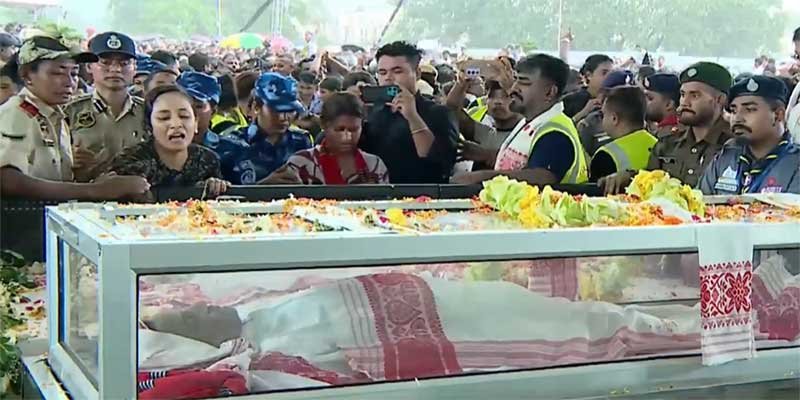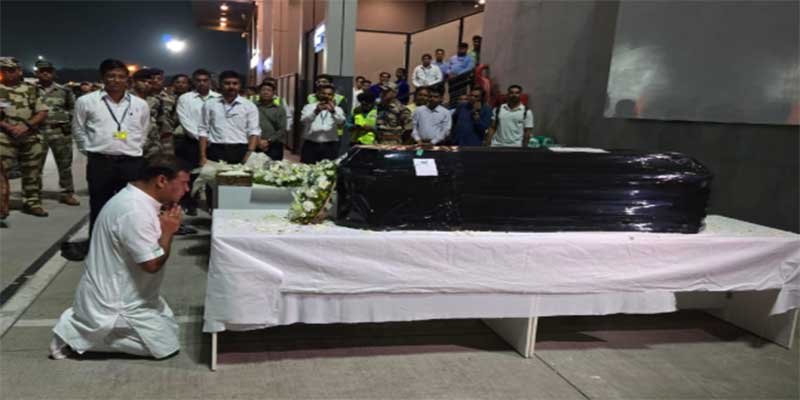Assam Weeps as Zubeen Garg’s Final Journey Brings State to a Standstill
The journey of Garg's remains began in the early hours of Sunday, a poignant procession that symbolized the deep bond he shared with his homeland.

GUWAHATI- In a day etched with profound grief, Assam came to a virtual standstill as the mortal remains of Zubeen Garg, the 52-year-old singer-songwriter, actor, and cultural ambassador who defined the soul of Assamese music, embarked on their final journey home.
Zubeen’s untimely death in a tragic scuba diving accident in Singapore on September 19 has left an indelible void, with the state declaring three days of mourning from September 20 to 22. Shops shuttered, official events halted, and roads emptied as lakhs of fans, artists, and dignitaries gathered to honor the man whose voice once energized generations and bridged hearts across the Northeast and beyond.
The journey of Garg’s remains began in the early hours of Sunday, a poignant procession that symbolized the deep bond he shared with his homeland. After an autopsy in Singapore confirmed drowning due to a seizure while swimming without a life jacket during a yacht trip at Lazarus Island, his body was flown to Delhi’s Indira Gandhi International Airport late on September 20.
Also Read- Assam CM receives mortal remains of iconic singer Zubeen Garg at IGI Airport in Delhi
There, Assam Chief Minister Himanta Biswa Sarma, accompanied by Minister of State for External Affairs Pabitra Margherita and senior officials, received the casket amid tearful tributes. “Zubeen was more than a singer; he was Assam’s heartbeat,” Sarma said, his voice breaking as he laid wreaths and led a moment of silence.

From the Guwahati airport, the convoy—flanked by police and enveloped in a sea of mourning supporters—made its way through rain-slicked streets to Garg’s family home in Kahilipara, Guwahati.
Hundreds lined the route, many clutching garlands of marigolds and posters bearing lyrics from his iconic tracks like “O Mur Apunar Desh” and the Bollywood hit “Ya Ali.” A scuffle broke out briefly at the airport as an overwhelming crowd surged forward, underscoring the raw emotion of the moment.
Also Read- Zubeen Garg Demise Update : Three-Day Mourning Declared, FIRs Against Event Organizers
At the residence, the casket was placed in the prayer hall for about 90 minutes, allowing family members—including his wife, fashion designer Garima Saikia Garg, and elderly father—to bid a private goodbye. Viral videos captured Garima’s anguished cries, as she appealed for a peaceful farewell amid the chaos. “He was our everything—our joy, our fight, our voice,” she whispered to gathered kin, as traditional Assamese chants filled the air.

By mid-morning, the procession moved to the Arjun Bhogeswar Baruah Sports Complex (Sarusajai Stadium), Guwahati’s premier venue where Garg had performed countless times. Here, from 9 a.m. to 7 p.m., the stadium transformed into a grand vigil, its 30,000-capacity stands swelling with admirers from across Assam and neighboring states.
The government announcement described it as a space “for friends, followers, and admirers to pay their last respects to an artist larger than life.” Queues stretched for kilometers, with fans of all ages—many in traditional Assamese attire—waiting hours in the drizzle to file past the flower-draped casket. Elderly devotees sang his folk-inspired ballads softly, while youth groups staged impromptu tributes, reenacting scenes from his films like “Mission China”.
Also Read- Tragic End to a Melody: Assamese Icon Zubeen Garg dies in Singapore
As the day wore on, discussions intensified over the cremation site, with the family weighing options between Guwahati—practical for Garg’s ailing father—and Jorhat, his creative cradle from youth. Education Minister Ranoj Pegu noted the government’s support in providing “fitting options,” but emphasized the family’s final say.

Amid the solemnity, controversy simmered: The Assam government ordered a CID probe into the accident, with FIRs filed against the North East India Festival organizers and Garg’s manager for alleged negligence in safety protocols. Advocate Ratul Borah, who lodged one complaint, alleged the “mismanaged event” contributed to the tragedy, demanding accountability.
A State Halted in Heartfelt Tribute:
Assam’s Collective Pause Zubeen Garg’s passing transcended personal loss, halting the rhythm of daily life across Assam in a display of unified sorrow rarely witnessed since the demise of legends like Bhupen Hazarika. The three-day state mourning, announced by Chief Secretary Ravi Kota, suspended all official entertainment, dinners, and ceremonial functions, including benefit distributions under the ‘Sewa Saptah’ initiative—though essential services like health camps and TB support continued.
Guwahati, the epicenter of grief, saw markets, cinemas, and eateries voluntarily close, with the All Assam Students’ Union (AASU) and groups like Bir Lachit Sena enforcing symbolic shutdowns in areas like Maligaon. “What makes Assam famous? Tea, rhinos, and Zubeen,” one fan recalled in a viral clip, encapsulating his role as a cultural unifier.

Traffic eased to a crawl near key routes, as processions snaked through the city, with horns silenced in respect. Schools and colleges canceled classes, radio stations aired marathons of his hits—from soulful Assamese folk to multilingual anthems in Bodo, Karbi, and Hindi—and social media overflowed with #RIPZubeenGarg tributes, amassing millions of views.
In rural pockets like Jorhat and Tinsukia, village bands played his tunes at crossroads, while tea garden workers paused plucking to light earthen lamps. “He wasn’t just a voice; he was our fight for identity, our joy in struggle,” said AASU president Utpal Sharma, echoing the sentiment that Garg’s activism on social issues amplified his musical legacy.
Born Zubeen Borthakur in Tura, Meghalaya, in 1972, Garg rose from Jorhat’s streets to become Assam’s “eternal heartthrob,” blending folk roots with Bollywood flair. His discography of over 5,000 songs, including environmental anthems and films like *Kothanodi*, made him a philanthropist and bridge-builder. As the sun set on Sarusajai Stadium, fans lingered, whispering, “Ojon Xabhor Xopiro Xopun,” a line from his song evoking eternal dreams. In death, as in life, Zubeen Garg reminded Assam of its resilient spirit—one note at a time. Cremation details are expected soon, but his melody will endure.









